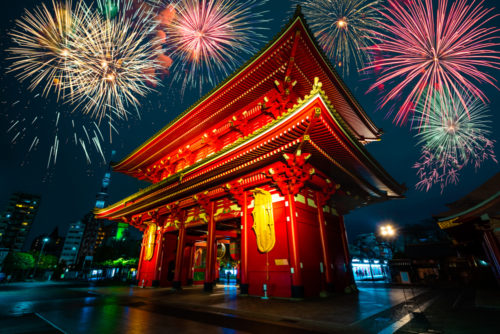
“Merry Christmas” in Japanese and 62 Other Holiday Phrases
Need to wish someone “Merry Christmas” in Japanese?
I’ve got you covered covered—the phrase is メリークリスマス (merii kurisumasu). But be aware: Christmas in Japan might be a bit different than what you’re used to.
So read on and learn some phrases you can use to spread holiday cheer. Plus, learn more about how Japan celebrates the holidays.
Contents
- Holiday Greetings and Well Wishes
- メリークリスマス — Merry Christmas!
- メリクリ — Merry Christmas! (shortened)
- 楽しいクリスマスを過ごして — Have a Merry Christmas!
- ジョワユノエル — Joyeux Noël!
- ハッピーホリデーズ — Happy Holidays!
- 楽しい祝日を過ごしてください — Enjoy the holidays!
- 明けましておめでとうございます — Happy New Year!
- あけおめ — Happy New Year! (informal)
- あけおメクリ — Merry Christmas and Happy New Year!
- Phrases for Giving and Receiving Gifts
- Essential Phrases for Shopping
- Japanese Christmas Traditions
- Japanese Christmas Media and Pop Culture
- Japanese New Year
- And One More Thing...
Download: This blog post is available as a convenient and portable PDF that you can take anywhere. Click here to get a copy. (Download)
Holiday Greetings and Well Wishes

Here are some common Japanese phrases for the end-of-year holidays:
メリークリスマス — Merry Christmas!
Romaji: Merii kurisumasu
This is the standard Japanese adaptation of the classic English greeting. It’s easy to remember because they sound similar!
メリクリ — Merry Christmas! (shortened)
Romaji: Merikuri
You can think of this as a casual form of the usual “Merry Christmas” greeting. It’s often used among friends or on social media.
楽しいクリスマスを過ごして — Have a Merry Christmas!
Romaji: Tanoshii kurisumasu o sugoshite
Another translation for this is: “Have a fun Christmas!” This phrase includes the verb 過ごす (すごす), meaning “to spend (time),” and you’ll see it a lot in Christmas cards and messages.
ジョワユノエル — Joyeux Noël!
Romaji: Jowayu Noeru
This phrase is French for Merry Christmas. Japanese is full of loan words and phrases from other languages. You may see this one on signs and promotional materials around the holidays.
ハッピーホリデーズ — Happy Holidays!
Romaji: Happī horidēzu
This is another loan phrase from English, and it works for more general well-wishing.
楽しい祝日を過ごしてください — Enjoy the holidays!
Romaji: Tanoshii shukujitsu o sugoshite kudasai
This has a similar meaning to ハッピーホリデーズ above, but it uses Japanese rather than the English loan words.
明けましておめでとうございます — Happy New Year!
Romaji: Akemashite omedetō gozaimasu
With New Year following right after Christmas, this greeting will come in handy too. You can add ございます to this phrase depending on the person you’re talking to in order to express politeness.
あけおめ — Happy New Year! (informal)
Romaji: Ake ome
This is especially popular among younger people and in text messages or social media because it’s more casual.
あけおメクリ — Merry Christmas and Happy New Year!
Romaji: Ake o mekuri
Express all of your holiday greetings with this simple phrase!
Phrases for Giving and Receiving Gifts

As with most places, Christmas in Japan is a time for gift-giving.
Etiquette is important in Japan, so this may be a good time to go over some basic polite language too.
Here are some phrases you can use:
贈り物 (おくりもの)
gift
これ、好きかなと思って。 (これ、すきかなとおもって)
I thought you might like this so…
詰まらない物ですが (つまらないものですが)
This isn’t much but…
気に入ってもらえるといいのですが (きにいってもらえるといいのですが)
I hope you like it…
お祝いのしるしです。 (おいわいのしるしです)
In the spirit of Christmas (here’s a gift for you).
心ばかりの品ですが、どうぞお受け取り下さい。 (こころばかりのしなですが、どうぞおうけとりください)
Please accept this small token of gratitude.
Essential Phrases for Shopping

What are the holidays without shopping?
Here are some phrases you can use when trying to purchase something:
これはいくらですか。
How much is this?
クレジットカードで払えますか? (くれじっとかーどではらえますか?)
Can I pay with a credit card?
〇〇 用のクリスマスプレゼントのお勧めはありますか? (〇〇ようのくりすますぷれぜんとのおすすめはありますか)
Do you recommend any gifts for XX?
You can replace the circles with 彼女 (かのじょ)— girlfriend, 彼氏 (かれし)— boyfriend, 家族 (かぞく)— family, 友達 (ともだち )— friend and so on.
これの色違いはありますか。 (これのいろちがいはありますか)
Do you have this in a different color?
別のサイズはありますか。 (べつのさいずはありますか)
Do you have this in another size?
Or, if you need to return something, use:
レシートはあります。 (れしーとはあります)
I have a receipt.
返金できますか。 (へんきんできますか)
Can I have a refund?
この商品を交換できますか。 (このしょうひんをこうかんできますか)
Can I exchange this item?
この商品には傷があります。 (このしょうひんにはきずがあります)
This product is damaged (has damages).
この商品は壊れています。 (このしょうひんはこわれています)
This product is broken.
サイズが違います。 (サイズがちがいます)
This is the wrong size.
ここに汚れがあります・汚れています。 (ここによごれがあります・よごれています)
There’s a stain here.
Japanese Christmas Traditions
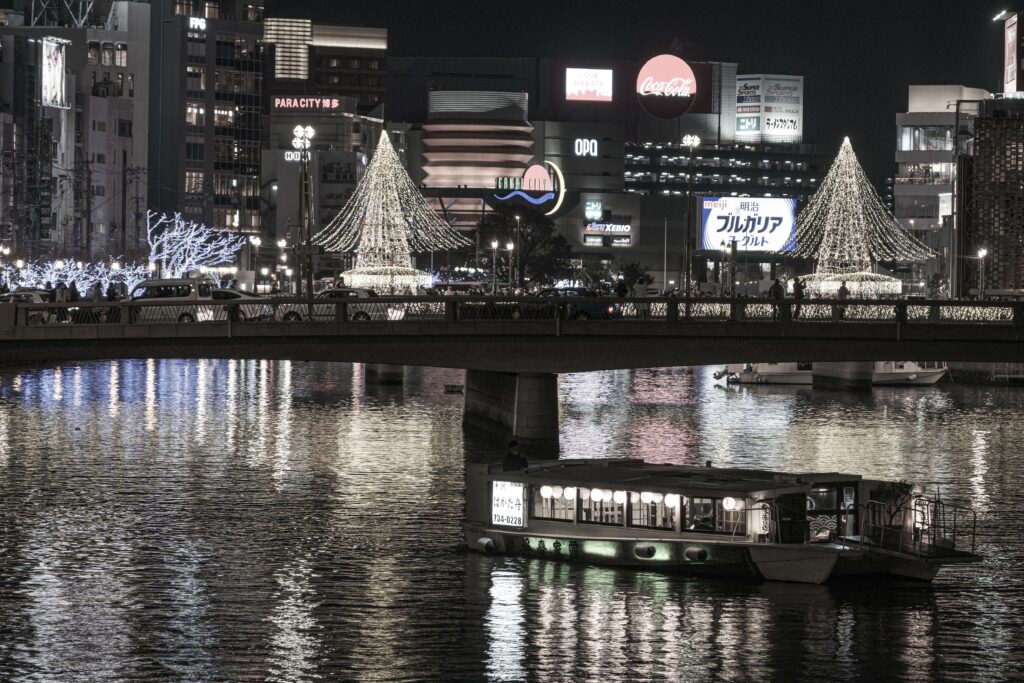
Japanese Christmas is a secular holiday. December 25th isn’t recognized as a national holiday like it is in the United States and other parts of the world. People still go to work and school as usual.
Shopping centers will put up elaborate decorations and eye-catching lights, though. People also spend Christmas more with friends or partners, with family reunions and traditional customs mostly reserved for New Year.
While Japan has its own unique customs for Christmas, there are still some areas of overlap with other countries:
サンタクロース (さんたくろーす)
Santa Claus
No one’s leaving out milk and cookies for Old Saint Nick. It’s more common to see people dressing up as him for Christmas parties. Santa also appears on most holiday merchandise and promotional material.
マスコット (ますこっと)
mascot
Instead of Santa Claus, a prefecture’s mascot is the one that gears up in holiday swagger and visits everyone!
Christmas Sight-seeing
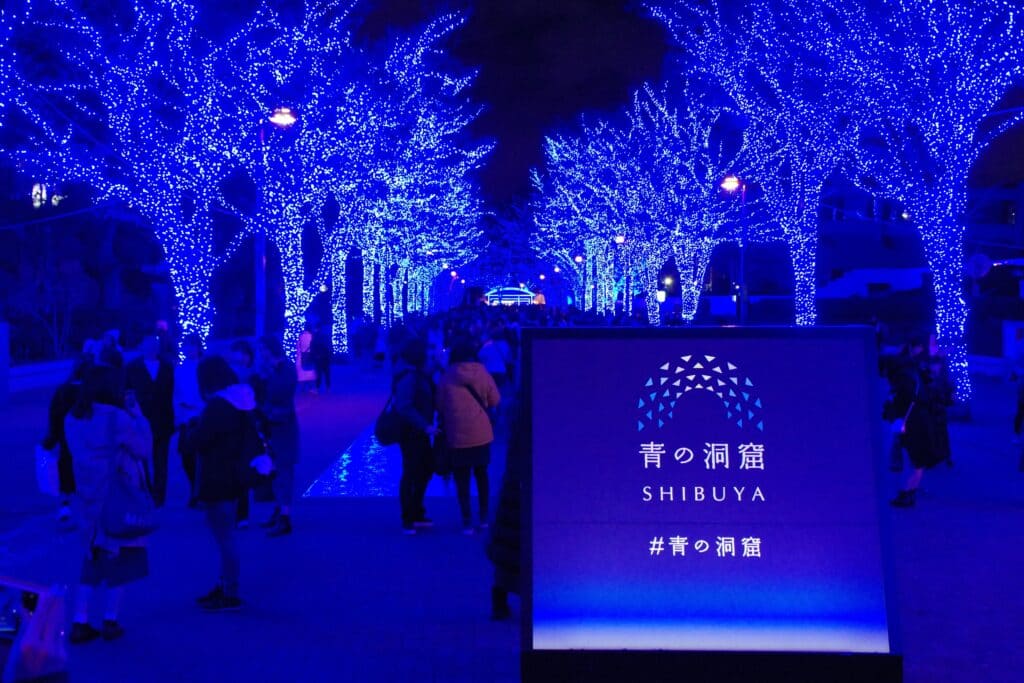
Christmas is a great time to visit Japan because of the many holiday-themed attractions offered.
Here are some phrases related to holiday traditions in Japan:
イルミネーション (いるみねーしょん)
Christmas light decorations
These dazzling lights fill many streets and corners of Japan. One of the most recognizable decorations is Osaka Castle. It’s mesmerizing to see in person if you ever get the chance.
年末詣で (ねんまつもうで)
“Year-end visit” to a temple or shrine
Temples and shrines play a huge part in Japanese culture. Around the end of the year, many individuals and businesses flock to Japan’s historical locales to seek good fortune going into the New Year.
Some common practices for people visiting temples include wishing for luck, blessing their homes and families and purifying bad thoughts and habits.
Japanese Christmas Food Traditions

Forget the turkey and candy canes, Japan adopted Kentucky Fried Chicken as part of its Christmas traditions.
ケンタッキー (けんたっきー)
Kentucky Fried Chicken
This crispy choice originated in 1974, when Takeshi Okawara, a KFC employee, started the slogan:
クリスマスはケンタッキー (くりすますはけんたっきー)
“Kentucky Fried Chicken For Christmas!”
From there, the phrase became the ho! ho! ho! of Christmas in Japan.
If fried food isn’t your thing, try something sweet. Around this time of year, Japan has got plenty of sweets to satisfy your sweet tooth!
Cakes are very common during the holidays, especially sponge cakes.
ケーキ (けーき)
cake
スポンジケーキ (すぽんじけーき)
sponge cake
Japan also has a knack for making its delicacies stand out as part of its 可愛い文化 (かわいいぶんか)— cute culture so you can’t pass a window without seeing some mouth-watering food.
Be warned, though: many of these are actually サンプル (さんぷる)— samples or fake food meant to draw in customers.
Words of Love and Affection

Christmas is all about love in Japan. It’s like another Valentine’s Day.
In addition to celebrating Valentine’s Day on February 14th, Japan also celebrates its own version of Valentine’s Day, known as ホワイトデー (ほわいとでー)— White Day on March 14th.
But when it comes to romance, Christmas takes the cake!
This is because Japan sees Christmas as the symbol of romance, as shown in this retro Japanese Christmas commercial compilation by Japanese Railway (JR) Lines.
Christmas is the perfect time for expressing affection. If you want to get sweet on that special someone, you might as well do it in Japanese:
あなたがいるだけで、クリスマスが楽しい。 (あなたがいるだけで、くりすますがたのしい)
Just being here with you makes Christmas fun!
ずっと一緒にいたい。 (ずっといっしょにいたい)
I want to be with you always!
一緒にいても、離れていても、あなたのことを想っている。 (いっしょにいても、はなれていても、あなたのことをおもっている)
Whether we’re together or apart, I’m always thinking of you.
私達の愛こそが完璧なクリスマスプレゼント。 (わたしたちのあいこそがかんぺきなくりすますぷれぜんと)
Our love is the perfect Christmas present.
愛以上に素晴らしいクリスマスプレゼントはないよね。 (あいじょうにすばらしいくりすますぷれぜんとはないよね)
There’s no gift greater than love.
And if you’ll be going out a lot, maybe Santa can give you enough confidence to ask someone out!
Japanese Christmas Media and Pop Culture
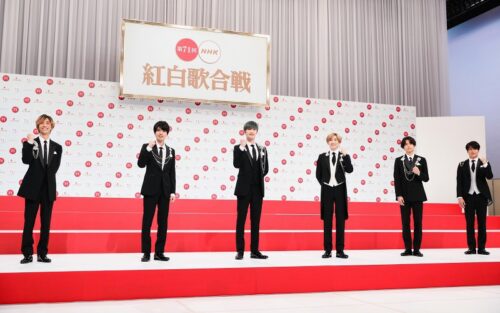
Experiencing the Holidays on TV
If you’re not interested in going out (or if you’re not in Japan), stay inside and watch some TV! Japan has got plenty of holiday specials that they broadcast in the spirit of Christmas.
紅白歌合戦 (こうはくうたがっせん)
Red and White Singing Competition
The NWK hosts this competition for the New Year. The colors almost remind me of Christmas but the focus is on celebrating the New Year with song. It’s worth watching online if you have access! For some bonus learning assistance, you can find clips from holiday programming on FluentU, along with many other native Japanese videos.
FluentU takes authentic videos—like music videos, movie trailers, news and inspiring talks—and turns them into personalized language learning lessons.
You can try FluentU for free for 2 weeks. Check out the website or download the iOS app or Android app.
P.S. Click here to take advantage of our current sale! (Expires at the end of this month.)

Listening to Japanese Christmas Music
Even though Christmas is an imported holiday, Japan has a ton of incredible Christmas music to wake up your holiday spirit. Here’s a famous Japanese Christmas song:
This song is called いつかのメリークリスマス(いつかのめりーくりすます)or “Someday, A Merry Christmas,” It’s by B’z, a popular rock duo.
Other songs include:
クリスマスソング(くりすますそんぐ)
“Christmas Song” by back number, a well-known power rock trio.
Dear…again
“Dear…again” by Kohmi Hirose, although she’s most known for her “get down” song, Promise.
Merry Christmas
“Merry Christmas” by Bump of Chicken, one of Japan’s most iconic J-rock bands.
We have a list of more Christmas carols in Japanese if you’re looking for even more seasonal music.
Japanese New Year
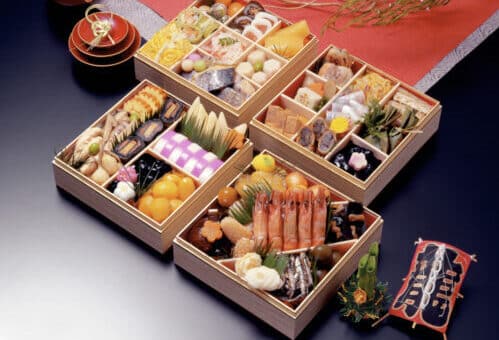
Unlike Christmas, the New Year is a national holiday. Businesses usually close from the first of January until the third to honor the New Year.
Aside from the New Year greetings listed above, here are a couple more:
今年もよろしくお願いします (ことしもよろしくおねがいします)
Lit. Please treat me well this year too!
This is a pretty polite way to speak and is usually written instead of spoken:
謹んで新年のお慶びを申し上げます (つつしんでしんねんのおよろこびをもうしあげます)
Humbly wishing you a Happy New Year.
You’ll also see New Year’s wishes written as:
初春(はつはる・しょしゅん)
Lit., “Spring Begins”
新年(しんねん)
“New Year”
新春(しんしゅん)
“New Spring”
迎春(げいしゅん)
“Welcoming Spring”
Why do the Japanese mention spring so much? Spring is known as the time when 桜 (さくら)”cherry blossoms” are in bloom. This represents a new beginning.
Until 節分 (せつぶん), “the coming of spring,” people often prepare for turning over a new leaf. It’s not unlike New Year’s resolutions in other parts of the world.
New Year’s Traditions

忘年会 (ぼうねんかい)
year-end parties
From offices to schools, people love gathering to have fun and exchange gifts.
カラオケボックス (からおけぼっくす)
karaoke boxes
These are karaoke rooms that are rented out for parties. Other than letting you show off your karaoke skills, it’s a fun experience that can also involve giving and receiving gifts.
初詣 (はつもうで)
The first visit of the year to a shrine or temple.
This custom usually involves tons of people gathered around to celebrate the year ending and a new beginning. Like many New Year’s traditions, it’s intended to welcome good fortune for the New Year.
年賀状 (ねんがじょう)
Japanese New Year’s Cards
These are special ways to practice writing Japanese. Brush up on your kanji by writing thoughtful cards to your friends.
You should know that the Japanese postal system works a little differently from the U.S. one. If you want to send out a card, this visual guide is extremely helpful.
除夜の鐘 (じょやのかね)
New Year’s bell.
On New Year’s Eve, temples also ring the bell 108 times, which is known as the New Year’s bell. Monks ring it to purify bad spirits and prepare for a good year.
New Year’s Foods
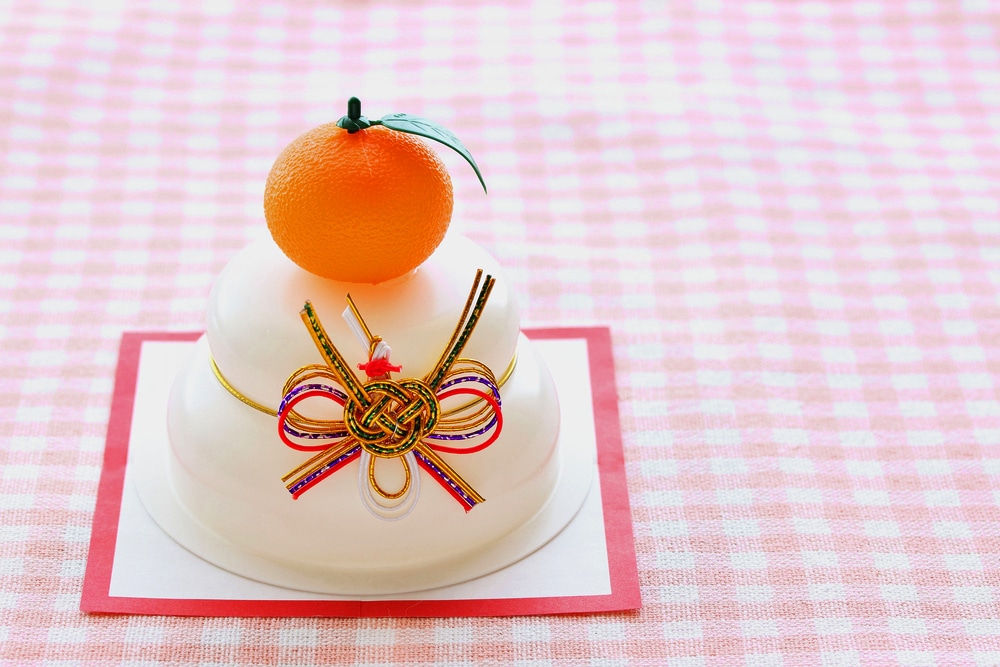
Who doesn’t love Japanese food? You’ll want to get acquainted with some of the words for delicious food in Japan if you ever plan to go.
If you’re in Japan during the holidays, you’re in for a special treat in the form of お節料理(おせちりょうり or traditional Japanese New Year’s dishes.
弁当 (べんとう)
lunch boxes
Japanese lunch boxes, or bento boxes, are a delicious way to celebrate the New Year.
These boxes contain beautifully arranged ingredients such as:
大根 (だいこん)
pickled radishes
海老 (えび)
shrimp
Bento boxes are more savory than sweet, and eating them is said to bring good luck.
年越しそば (としこしそば)
New Year’s buckwheat noodles
This is one of the most common New Year’s meals, though there are different recipes and variations on how the noodles are prepared.
餅 (もち)
sticky rice balls
Japanese sticky rice balls, or mochi, are made by repeatedly beating rice. This delicacy is known for its neutral and nutty taste.
Mochi can take a lot of preparation to make properly. There are plenty of stores where you can buy mochi that’s already been prepared and decorated for you.
乾菓子(ひがし)
dry sweets
Japanese dry sweets include dry candy and cookies, and they are good luck charms commonly eaten at the end of the year. They come in many different flavors and types.
Take some time this December to explore some of these Japanese holiday traditions. It’s a great way to learn more about Japanese culture and spread holiday cheer at the same time!
And One More Thing...
If you love learning Japanese with authentic materials, then I should also tell you more about FluentU.
FluentU naturally and gradually eases you into learning Japanese language and culture. You'll learn real Japanese as it's spoken in real life.
FluentU has a broad range of contemporary videos as you'll see below:

FluentU makes these native Japanese videos approachable through interactive transcripts. Tap on any word to look it up instantly.

All definitions have multiple examples, and they're written for Japanese learners like you. Tap to add words you'd like to review to a vocab list.

And FluentU has a learn mode which turns every video into a language learning lesson. You can always swipe left or right to see more examples.

The best part? FluentU keeps track of your vocabulary, and gives you extra practice with difficult words. It'll even remind you when it’s time to review what you’ve learned. You'll have a 100% personalized experience.
Start using the FluentU website on your computer or tablet or, better yet, download the FluentU app from the iTunes or Google Play store. Click here to take advantage of our current sale! (Expires at the end of this month.)


